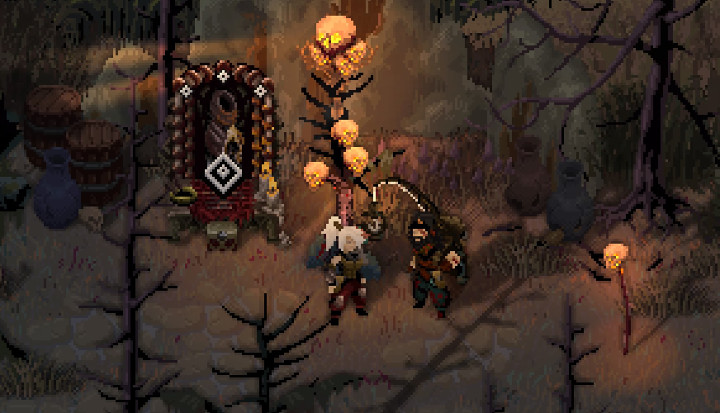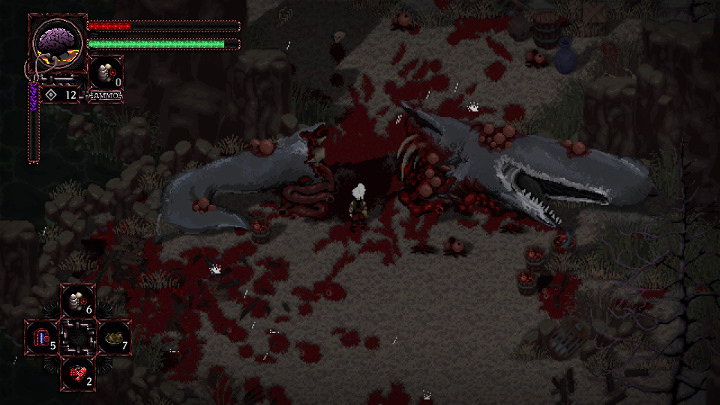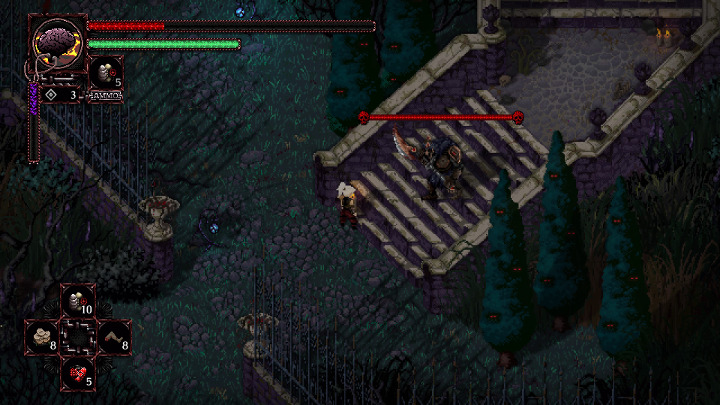
Despite the game’s pixel-art aesthetic, the first thing I thought when I saw Morbid: The Seven Acolytes is that it reminds me of Bloodborne. Bloodborne, of course, was made by FromSoftware, who also made the Dark Souls games. So Bloodborne has Souls in its DNA, and some of that same DNA has been passed down to Morbid: The Seven Acolytes (I’m sure geneticists are cringing at how bad this metaphor is breaking down).
The world of the game feels very much like it could exist within the same universe as Bloodborne. It has a gothic Victorian vibe that’s laced with Lovecraftian monstrosities, as well as location names like the Gardens of Mornia and the City of Yortael, which wouldn’t feel at all out of place in a world that contains Yharnam.

The combat, despite taking place in a two-dimensional, 16-bit world, has a similar heft to it. There’s a slow, heavy weight to every sword swing, which makes combat about observation and taking openings as they come rather than hacking wildly about.
As a point of contention here, there is also a mechanic that sort of locks you onto the nearest enemy once your sword starts swinging. This removes the fear of missing a swing by one or two pixels, as you’ll be slightly pulled toward the enemy once your weapon reaches its full momentum. If this sounds like a misstep, I promise you, it adds a tightness to the controls that makes the game feel really good to play, even in its most frustratingly brutal moments.
And, like Bloodborne, Morbid: The Seven Acolytes doesn’t shy away from those teeth-clenching, brick-wall-style boss fights, oftentimes throwing you into a situation you feel woefully underprepared for.
For example, the first time I fought Bile Toad Putrus, the Spawn of Disgust (one of the titular Acolytes), I got beaten so badly that I wondered how the fight was even possible. Then I went off and explored other parts of the world. When I came back later to try again, I defeated the ugly toad on the first try.
These boss fights are as much about understanding how various playstyles contrast with the enemy’s moveset as they are about moment-to-moment reflexes. Having the right weapon, the right tactics, and the right pacing (especially the right pacing) can alter the course of any boss battle. This is yet another point of similarity between Morbid and Bloodborne (and Dark Souls by extension).

But Morbid: The Seven Acolytes lacks the one thing that defines the Soulslike genre for most people. There are no souls (or their equivalent) to lose when you die, and no real punishment for death besides getting sent back to the nearest shrine. You’ll keep all the XP you’ve earned, and oftentimes you’ll even keep the items you’ve collected since your last shrine visit (though not always).
So as comfortable as I am calling Morbid: The Seven Acolytes a Bloodborne-like, I’m hesitant to go one step further and call it a Soulslike. It definitely shares a lot of similarities with Dark Souls, yet it lacks that one core feature that I think defines the genre.
But that made me wonder how strictly this one feature defines the genre, or if it defines it at all. My guess is that, if asked directly, players would be divided on this issue. The Soulslike genre has nothing like the Berlin Interpretation to define its parameters, so the term gets thrown around sort of loosey-goosey these days (then again, so does the term Roguelike, so I’m not sure the Berlin Interpretation has as much weight as I’d like to think it does).
Does a Bloodborne-like necessarily need to be a Soulslike? I suppose not, though I also don’t think Bloodborne-like is a common term like Soulslike is. In fact, it might not be a real thing at all. But if it is a real thing, then Morbid: The Seven Acolytes is very much a Bloodborne-like, but maybe not a Soulslike in the strictest sense.
So if you’re looking for a pixel-art game with a very distinctly Bloodbornian feel to it, Morbid: The Seven Acolytes is exactly what you need — unless the lack of soul-collecting mechanic is a dealbreaker for you. In which case, I’ve got a whole heap of other games to recommend…